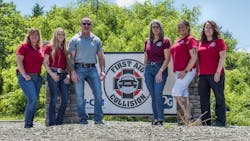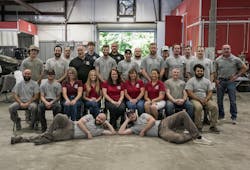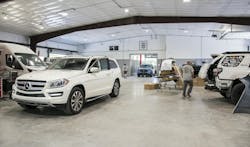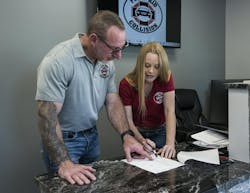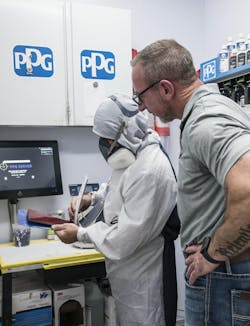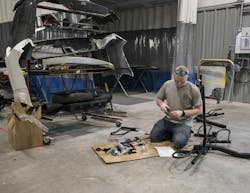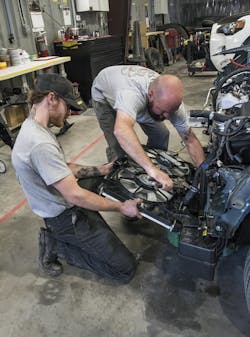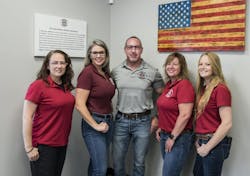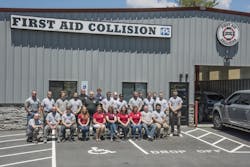Joe LaBruno plays the long game — he’s constantly “working on his businesses to stay in the business,” he says, always making decisions based on what’s best for his shops in the long-term.
It’s this future-focused mindset that has allowed him to expand his shop, First Aid Collision in western North Carolina, from one location to three locations in the span of only six years, and he’s set his sights on more expansion down the line.
As it turns out, the industry veteran has an advantage not many of his competitors have — before he was a successful, multi-collision shop owner, he was a successful mechanical repair shop owner, and he learned early how important customer service is to the viability of a business. Even though the collision and mechanical worlds can be quite different, he says, there’s one constant — the customer.
Prioritizing the Customer
LaBruno entered the mechanical side of the industry at 19, first working as a technician before opening and running his own shop for 15 years, from 2005 to 2020.
According to LaBruno, distrust runs rampant in the mechanical repair world; many customers walk through the door with a preconceived notion about the business, and they’re leery out of the gate. Throughout the years, he learned to overcome that hurdle by thoroughly educating his customers about their cars and repairs.
“Even though the end result is sort of the same — we’re fixing cars — the process to get there is totally different in the mechanic and collision worlds. In the mechanical world, you're always scratching for work…you really, really have to know your customer service.”
As such, he’s always prioritized his customers…and that, he says, is what gives him the upper hand. Even though LaBruno is “pretty much surrounded” by consolidators nowadays, he’s not worried.
“Our customer service is probably the best of any collision center around. I'm not trying to brag; it’s because we do a lot of training and make sure we’re meeting customers’ expectations. I think that's what makes my shop a little different than most in our area.”
The Journey to Collision
At the beginning of his ownership journey, LaBruno wore “all the hats” in his mechanic shop, working on the cars while simultaneously running the business. It wasn’t until he joined forces with ATI about seven years in that he says he learned how to better manage employees so he could step back and play the long game of growing the business:“working on it instead of in it.”
Once he had some breathing room, however, he realized he wanted a new challenge — and as fate would have it, his uncle owned a collision repair shop next door that was calling his name.
“I started messing around a little, writing estimates since I had some time on my hands,” he reminisced. “One thing led to another, and I found myself interested in the collision world.”
It didn’t take LaBruno long to venture into ownership on the collision side — he found a paintless dent repair (PDR) business for sale about eight miles away from his uncle’s operation and took the plunge into dual ownership in 2018. He invested in the shop to make it a full collision repair center and ran both the mechanic and collision repair shops for about two years.
“I thought it was a great idea to feed the mechanical side of the collision center to the mechanical shop. But, after two years of doing both, I realized I really couldn't put 100% into the collision center the way I wanted.”
Feeling as though he’d taken the mechanical repair shop as far as he could and with a growing interest in the collision repair world, he made the decision to sell the mechanic shop in 2020 and put all his time and effort into First Aid Collision, and it started “growing like a weed.”
Accelerated Expansion
When LaBruno found himself booked out for a month, even two, at his 5,000 sq. ft. location in Arden, North Carolina, he knew it was time to expand. Finding an existing shop to purchase wasn’t easy, however, so he opted to build his second location from the ground up. With 11,500 sq. ft. of shop space, First Aid Collison – Hendersonville opened its doors in December 2022, bringing in $2.5 million in its first year.
The shop was so successful that the decision to purchase a third came easily. And unlike the second shop, the third one “pretty much popped up in my backyard,” he says. Myers CarSmart Collision in Brevard, an older, 13,000 sq. ft. independent operation, became First Aid Collision – Brevard in May 2024. Although the shop is bringing in revenue, “it could do much better…so that’s our next goal, to start hitting targets there.”
LaBruno “has his hands full, for the moment,” but he’s always looking ahead to the future, thinking about where shop #4 might be. LaBruno and his family spend a lot of time in Seneca, South Carolina, so he’s thinking about expanding to that area in roughly five years. But he acknowledges, “you never know what opportunities are going to come.”
Growing with the Right People
One of the biggest catalysts to his rapid expansion, LaBruno says, are the people he’s surrounded himself with. Between himself and his wife, Jennifer, who handles the accounting, HR, and community relations for the business, First Aid Collison now has 30 employees, plus lots of other professional partners that play important roles in the business, too.
“Without great managers and employees, I wouldn't be able to do what I do,” LaBruno stated categorically.
It’s extremely important, he continued, for owners to create good teams within their companies. And leadership is huge.
Every time he opens a new location, LaBruno trains a manager months in advance of opening to ensure they’re ready to hit the ground running come opening day. Training processes are key to success, and LaBruno certainly has them. But what’s really important, he says, is finding managers who truly own the company culture and live it out in front of employees.
“People have to believe in your vision. If they do, they’ll work hard to help you achieve it. Pay your employees well, train them, treat them well…and you’ll create a team that will allow you to expand as much as you want.”
LaBruno invests in his team, but not only through pay and benefits. Team-building activities are important, too, and add to the family-like atmosphere in the shops.
“We’ve gone whitewater rafting, ax-throwing, golfing…you name it. And we have group lunches often.”
The team truly enjoys working together, and LaBruno works incredibly hard to maintain the culture he’s built when bringing in new hires.
“We don't just put a body in place if we know they’re not going to fit our culture. You might be an amazing technician or estimator, but if I can tell you're not going to fit my culture — you're not a team player — I'm not going to hire you. I’d rather backlog and do the best we can with what we have until we find the right person. Again, I'm looking at the long term.”
So, how does he find the right candidates?
It’s difficult, he admits, the same as it is for everyone in the industry right now.
“Not only is there a labor shortage; there's a big-time shortage of the right person, the one who will fit in well with the culture and team. We have structure. We have SOPs. We have all that pretty much laid down and in place; we just have to implement it. But finding the right people —that’s the real challenge.”
LaBruno is active in local business groups, and he’s always making connections.
“Anytime I run across somebody that I think could be a good candidate, I'm always taking numbers and meeting people and shaking hands.”
He also undertakes an extensive interview process, and always checks references. Partnering with the local community college has yielded excellent results, too.
“We put on presentations at Blue Ridge Community College, and we have apprentice programs with them, too. We work with local high schools as well. I have several apprentices from the college, and I’ve developed some of my best technicians from Blue Ridge.”
The Extended Team
In addition to his staff, LaBruno can’t emphasize enough the importance of hiring key professionals outside the industry who can advise and help you grow your business. An excellent accountant, lawyer, realtor, and banker are nonnegotiable, he says, and once you find one or two great partners, they’ll lead you to the next. Mentors and coaches are invaluable, too — both LaBruno and his managers are still coached on a weekly basis through ATI.
“A lot of owners think they don't have the money to surround themselves with these people, or they're trying to do it on their own to keep their money. That’s just not sustainable, and it’s definitely not a sure way to grow.” It all comes down to paying the right people to do the right jobs, he says, and investing in the right equipment and software to empower them to do it.
The investment principle is one LaBruno embraced from the beginning — he didn’t take a paycheck at all during his first year of business to make sure he could pay everyone else and hire the right help. As an owner, he says, you must lose the mentality you need to do everything on your own.
“If you look at it from strictly an owner standpoint — getting the businesses up and running quickly, creating great cultures, and establishing the financial stability to be able to pay these employees good money — it really all stems from the teams that I have in place around me.”
Play the long game, says LaBruno: think of where you want to be in three years, or five years, and put a plan in place with the right people to help you make it happen.
The saying is true…teamwork makes the dream work.
